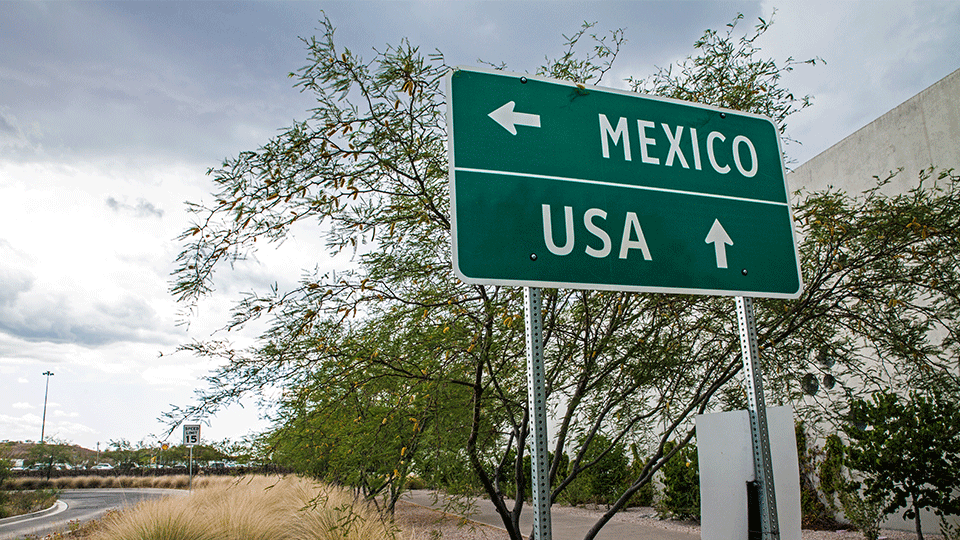
Key Takeaways:
- U.S. shippers should not expect their cargo coverage to apply in Mexico.
- Mexican law limits carrier liability, which often results in a coverage gap, particularly on especially heavy shipments or those of an undeclared value.
- Best practices for shippers moving freight in Mexico include procuring additional insurance and accurately declaring the value of shipments prior to transport.
No matter what business or industry you’re in, getting your cargo to its end customer in good condition is vital.
Cargo coverage is an important part of achieving that goal for both domestic and international shipments, but for many shippers, it can be confusing — especially where Mexico is concerned.
Carrier liability is not managed or regulated the same in Mexico as it is in the U.S.
Without understanding how cargo liability coverage differs between these countries, you could find yourself under-insured and without a solution if freight damage or losses occur.
Here at Anderson Trucking Service (ATS), we’ve been helping companies move freight over the U.S-Mexico border for decades. We’ve seen how confusing cargo liability rules and regulations can be for shippers, and how important it is for shippers to do their due diligence before moving cross-border freight.
In this article, we’ll cover the way carrier cargo liability functions in both the U.S. and Mexico and help you understand your role in ensuring (and insuring!) your cargo’s safe travel.
How Cargo Insurance Works in The U.S.
In the U.S., motor carriers are generally liable for the full actual loss, damage or injury to cargo that occurs during transport. This is laid out in 49 U.S.C. § 14706, commonly referred to as the Carmack Amendment, which governs claims for loss or damage to cargo transported over the road and across state lines.
Under the Carmack Amendment, the carrier’s liability is unlimited unless otherwise agreed.
In practice, this means that most carriers will insist on some sort of limit. This limit is often stated in terms of a maximum amount per trailer used or a maximum value per pound of cargo.
In the U.S., the most common liability limit is $100,000 per trailer used. Not coincidentally, $100,000 is also the most common amount of cargo insurance coverage that a U.S. carrier will have.
That said, trucking companies may offer shippers higher limits upon request. These limits are often segmented into $250,000, $500,000 and $1,000,000 levels and are coupled with corresponding cargo insurance coverages.
As such, the cargo liability and insurance coverages in place across the U.S. leave shippers with few unknowns regarding responsibility for cargo losses, provided their freight’s value matches the provided coverages and that the applicable insurance doesn’t exclude their particular type of freight.
These regulations and practices, however, exclusively apply to freight transportation within the U.S. Once a shipment crosses international borders, it’s a very different ball game.
How Cargo Insurance Works in Mexico
Unlike in the U.S., in Mexico, motor carrier liability is limited by law and is determined in part by whether the value of the shipment has been declared by the shipper.
The Law of Roads, Bridges and Federal Motor Transportation, passed in Mexico in 1993, addresses the cargo liability of motor carriers in Mexico.
Under Chapter II, Article 66, subpoint V of that law, if the shipper does not declare the shipment’s value, the carrier is only responsible for paying out a maximum of 15 days' worth of the current Mexican Federal minimum wage per ton of the shipment’s weight should damage/theft occur.

To put that in mathematical terms:
(Current Mexican Minimum Wage x Shipment Weight in Tons) x 15 = Maximum Carrier Liability on a Shipment of Undeclared Value
Here’s what that looks like in practice: Imagine a shipment of undeclared value weighing 20 tons (40,000 pounds) traveling through Mexico.
As of January 1, 2025, Mexico’s general daily minimum wage was raised to 278.80 pesos, which is the equivalent of $15.01 USD.
Plug those numbers into our equation, and you’ll find that our hypothetical shipment is only covered up to $4,503 USD when traveling through Mexico.
If the cargo’s value is declared, the shipper can pay an additional fee to the carrier to cover the cargo beyond the stated limit. However, the extent of this coverage varies, and rarely covers the entire cargo value declared.
Still, it’s in your best interest as a shipper to declare the value of your shipment before it travels through Mexico, as it gives you an additional option for coverage if there is a gap between the value of your shipment and the limit imposed by Mexican law.
How to Insure Your U.S.-Mexico Freight
Usually, cargo coverage offered by a U.S.-based freight carrier doesn’t extend beyond the border. That means you will need two distinct coverage policies: one that protects your freight within the U.S., and one that protects it within Mexico.
The two most common methods of insuring cross-border cargo within Mexico are:
- Get coverage through your logistics provider
- Self-insure with a cross-border coverage policy
Get Insurance Through Your Logistics Provider
It may be possible to receive extended cargo coverage from your Mexico-based logistics provider upon request.
Though this will increase your shipping costs, if damages or loss should occur during transit, having the appropriate coverage will be key to minimizing the blow to your bottom line.
If you aren’t working directly with a Mexico-based logistics provider, an experienced U.S.-based provider should be able to facilitate this transaction.
Self-Insure with Cross-Border Coverage
Some insurance agencies offer cross-border coverage to shippers moving goods over the U.S.-Mexico border. Purchasing insurance through these third-party companies is another way to make sure your freight is properly covered.
To find a reputable insurance company offering cross-border coverage, ask your U.S.-based logistics provider which agencies they recommend.
Providers that specialize in cross-border shipments (or, if not specialists, are highly experienced in executing them) often work with a handful of trusted agencies and will be able to point you toward the best fit for your needs.
Again, while self-insuring your freight for the Mexican leg of its journey will be an additional cost to your company, being appropriately covered will provide peace of mind during transportation — and a welcome financial cushion should anything go awry.
Build Your Cross-Border Confidence
If you walk away from this article with anything, let it be this: Never assume your cargo coverage will continue over the border.
Understanding the differences between each country’s regulations is key, but so is working with an experienced cross-border logistics provider that can help you navigate those differences.
As a shipper, ensuring the proper coverage of your freight is your responsibility. Following best practices, like declaring the value of your shipments and obtaining additional coverage to bridge any gaps, will minimize your risk, protect your bottom line, and keep your supply chain running smoothly.
Cargo coverage is just one unique nuance of cross-border shipping between the U.S. and Mexico. If you’re seeking a more comprehensive understanding of cross-border shipping processes, check out our article explaining how to ship to and from Mexico by truck.
We break down the entire process in an easy-to-understand format, so you can feel confident planning your next cross-border shipment.





